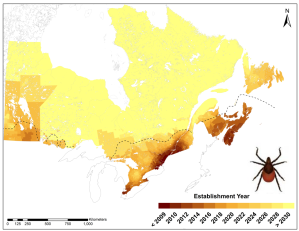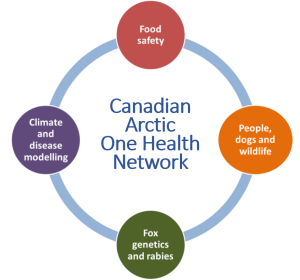Our research focuses on how ecological changes, such as climate change and other perturbations to ecosystems, alter the epidemiology of infectious diseases in wildlife and people within such changing ecosystems.
Vector-Borne Disease
Diseases transmitted by ticks and mosquitoes are an emerging public health threat in Canada. We are looking at how climate warming and land-use change alter the ecology and epidemiology of vector-borne diseases at the local, regional and continental scales. Much of this work is carried in collaboration with other Canadian researchers and stakeholders through the Canadian Lyme Disease Research Network (www.CLyDRN.ca).
Rabies
Rabies is a lethal disease that affects wild and domestic mammals worldwide, creating an important public health threat when humans are in contact with infected animals. We are using state-of-the-art mathematical modelling approaches to better understand rabies transmission in wildlife and the risk of disease spillover to domestic animals and people.

Arctic Zoonoses

Climate warming is resulting in dramatic changes to Arctic ecosystems, with impacts on diseases and parasites circulating in wildlife, and the health risks they pose to people living in the North. We are partnering with sentinel communities through the Canadian Arctic One Health Network to monitor, model and predict future trends in zoonotic disease risk in the changing Arctic.
Disease Modelling
 Ecological and epidemiological models are useful tools, not only for exploring the potential consequences of ecological change on disease systems but also for structuring scientific hypotheses and planning field research. Mathematical and statistical modelling approaches are an important component of our research, carried out in collaboration with other Canadian researchers through the Mathematics for Public Health (MfPH) network and the One Health Modelling Network for Emerging Infections (OMNI-RÉUNIS).
Ecological and epidemiological models are useful tools, not only for exploring the potential consequences of ecological change on disease systems but also for structuring scientific hypotheses and planning field research. Mathematical and statistical modelling approaches are an important component of our research, carried out in collaboration with other Canadian researchers through the Mathematics for Public Health (MfPH) network and the One Health Modelling Network for Emerging Infections (OMNI-RÉUNIS).


.

